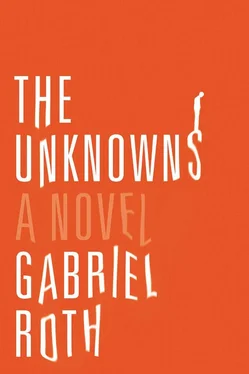“You’re going to start a dot-com!” she said. “I want to get in on the ground floor! You’re going to make us all rich!”
“I don’t know if I’m going to do it. I mean, it’s so geeky, and most of these things flop.”
“So what’s the alternative?” she said, in all seriousness, and I realized I couldn’t answer her.
Three and a half years and eighteen million dollars later, on the cold first sunny day of the year, Cynthia and I sit on the hillside at Dolores Park, looking out at the pastel houses and the towers and cantilevers of the Bay Bridge. Cynthia wore essentially the same thing every day since high school — blue jeans, T-shirts, hooded sweatshirts, sneakers — until she came out, at which point she switched to black jeans. She’s having some trouble acclimating to her new sexual identity.
“I just feel dumb that it’s taken me so long,” she says. “What is this, the 1950s? Was I in the closet ? That’s so passé.”
I, on the other hand, have acclimated quite successfully. Cynthia’s not masculine — her gentle manner suggests some kind of woodland creature, a fawn or a hobbit. But there’s something flirtless about her that makes our friendship possible. We have covered the basics: has she told her parents, is she maybe bisexual, is she ready to encounter a familiar set of genitals in a new context. “OK, I need to ask your advice,” she says. Everybody likes being asked for their advice. “Should I be a butch or a femme?”
“Don’t ask me,” I tell her, swallowing the sweet flat last sip of my beer. “I’m not in your target demographic.”
She tugs on my arm. “Help me with this,” she says. “It’s taken me too long to get here, and now I have all this catching up to do. I’m in the car with Sam the other day, and I’m driving, and she’s telling me about her day, and I’m thinking, This is what it feels like to be the guy . But then other times I want her to be the guy.”
“Do you have to lock yourself into one or the other?”
“You kind of do. Some women go for butch and some go for femme, and if you don’t fit in either category, nobody goes for you.”
“This is fascinating,” I say. “I can already see that your burgeoning sexual identity will open a rich vein of sociological insight for me.”
“Listen,” Cynthia says. “How do you talk to girls? I try to talk to these girls, and it’s great, they love me, I’ve got a dozen new best friends. But it doesn’t feel romantic .”
“No one is born knowing how to talk to girls,” I tell her. “It’s like how no one’s born knowing how to program in C++. When I first met you I was developing an approach to the problem that was compatible with my personality and affect and skill set.” And this approach, properly refined, has been the basis of my technique ever since. You make yourself available, but you hold something back, too. If you don’t have anything to hold back — because what do you have to offer, as a sixteen-year-old boy? You live with your parents, you’re unaccustomed to the length of your limbs, you’ve spent the past four years building up an encyclopedic knowledge of X-Men continuity… So you fake it, you feint, you draw her attention to the empty space you’re guarding to make her wonder what’s there. Does this translate to girl-on-girl situations?
“It’s like anything else,” I say finally. “Try different approaches. Iterate. Pretend you’re in a movie, and you’re playing a character who’s more charming and confident than you.” The fact that I have nothing to offer but truisms should be a warning sign. Later I will see that we’ve chosen the wrong problem.
The sun disappears behind us, quick enough to notice. We walk back to Cynthia’s, her hand on the handlebars of her bike. On the corner we initiate plans for a double date — she suggests dinner at her house before I can stop her — and say goodbye, and I continue down Guerrero Street, over the ridiculous hills, to Maya’s. We are going to rent a movie and get takeout.
On her narrow street people sit on stoops drinking Mexican beer from cans. The sky is glutted with cables, as though the whole city’s phone calls travel past her window. As I approach the building, the metal gate swings open and Maya’s housemate Bradley emerges; he’s a professional bicycle activist, and as far as I can tell his relationship with Maya consists exclusively of polite arguments about noise levels. He holds the gate open with a look that suggests my presence here is just one more way in which he is poorly treated.
“How’s it going, Bradley!” I say, to annoy him. He grunts and lets the door clang shut behind me. At the foot of the stairs is a sheaf of mail bound with a rubber band; visible on the bundle’s outside is a catalogue offering deals on professional broadcasting equipment. I scoop it up and bring it with me to assert my semi-resident status.
Maya meets me when I’m on the penultimate step. Our faces are at the same level, and we take advantage of this to kiss for a minute. From the living room I can hear CNN: The United Nations’ chief weapons inspector said today there’s no evidence that Saddam Hussein possesses weapons of mass destruction…
When she brings the kissing to a close, I hand her the mail and excuse myself. Bradley has decorated the bathroom with neo-Buddhist iconography, and a stick of incense sits half-ashed in a special wooden tray on the toilet tank. Reaching down to flush I feel the effect of the afternoon’s beers for the first time, as though I had to divest myself of their fluid content before the compromising chemical remnant could make itself known.
Maya is in the kitchen, looking at the mail spread out on the table. Roused by my presence she grabs an envelope and pushes out of the room. The timbre of her footsteps changes as she descends the stairs, and then the front door opens. When she returns her hands are empty and flutter at her sides like birds. She goes straight to the sink and washes them and then says, “You ready to go?”
“What was that?” I say, but she just shakes her head and gets her coat.
She walks quickly, despite the twilight crowd, and I am almost dancing to keep up with her. I tell her about my father’s pursuit of Bill Fleig, his stupid plan, his recent visit.
“I hadn’t seen him in three years,” I say. “Apparently he’d spent the whole time eating.”
“Did he want money?” she asks.
“Uh — no,” I say, trying not to trip over an abandoned VCR. I bet those non sequitur questions are unstoppable when she’s interviewing someone. “Where did that come from?”
“That’s what typically happens when somebody gets in touch with a relative who recently made eighteen million dollars,” she says, dropping a small explosive device into the conversation. “At least according to Behind the Music .”
“Ah, so you know about that.”
“I’m a reporter, Eric,” she says. “I know how to use Google. Why do you think I agreed to go out with you in the first place?”
“He didn’t want money,” I say. “He wanted me to go work for his dot-com. He tried to start a soda company when I was in high school, I think I told you.” In fact I remember exactly what I told her, but I’m trying to chart a course between repeating stories, like a narcissist, and revealing that I remember every word we’ve ever spoken to each other, like a psychopath. “But so now he’s decided that this whole Internet thing is his big moment, although of course he didn’t realize it until everyone else had packed up and gone home.”
“Do you see yourself as a nervous person?”
“I see myself as a life-support system for feelings of anxiety,” I say. “The anxiety is the organism and I’m the habitat.”
Читать дальше












